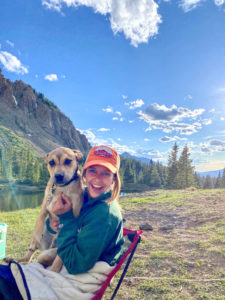 Hayley (Knicely) O’Shields is the preferred communities case manager at the African Community Center in Denver, working to create a position specifically for occupational therapists within the organization. In 2012, she earned her undergraduate degree in exercise sport science, with minors in international studies, public health, and sport and event management from Elon University in North Carolina. Before attending Colorado State University, O’Shields served two years in the US Peace Corps in Cambodia as a community health education volunteer. In 2016, she graduated from CSU with a master’s degree in occupational therapy. Outside of work, O’Shields enjoys all the outdoor activities Colorado has to offer, as well as playing with her two-year-old puppy and brewery-hopping with her husband.
Hayley (Knicely) O’Shields is the preferred communities case manager at the African Community Center in Denver, working to create a position specifically for occupational therapists within the organization. In 2012, she earned her undergraduate degree in exercise sport science, with minors in international studies, public health, and sport and event management from Elon University in North Carolina. Before attending Colorado State University, O’Shields served two years in the US Peace Corps in Cambodia as a community health education volunteer. In 2016, she graduated from CSU with a master’s degree in occupational therapy. Outside of work, O’Shields enjoys all the outdoor activities Colorado has to offer, as well as playing with her two-year-old puppy and brewery-hopping with her husband.
Describe your current position and some of the responsibilities that come with it.
I currently work at the African Community Center in Denver as a preferred communities case manager. My job is to provide intensive case management services to Afghan refugees who are especially vulnerable. My caseload mostly consists of women who have been exposed to psychological trauma and are experiencing social isolation and decreased integration into the community. I help with locating ESL classes, advocating for my clients to access these classes, educating my clients on how to use public transportation, linking my clients to benefits such as Social Security, WIC (Women, Infants and Children), CCAP (affordable childcare), Clothes to Kids, etc., and supporting them in any other area they are feeling particularly challenged.
How has COVID-19 changed operations for your industry, and how are you responding to it?
I entered this field in December of 2021, so COVID-19 had already been active for quite some time. From what I have heard, the refugee resettlement agencies were granted increased funding and more lenient timing for services to be provided. For example, most clients who join the PC (Preferred Communities) program are typically enrolled for six months up to one year. However, due to COVID-19, clients are allowed to be enrolled for up to two years. Additionally, increased funding was provided for transportation of clients to and from the ACC office for necessary meetings through transportation services such as Uber.
Why did you decide to pursue your current career path?
I am actually an occupational therapist by trade. I received my master’s in OT at CSU and worked in the Acute Care hospital setting for five years, as well as completed 10 months working in school-based OT last year. I have always had a passion for working with refugees and know that this is an emerging field for occupational therapy. I hadn’t been able to find any OTs in this field in Colorado, so I decided to forge my own path and get into the field myself. While I’m not currently titled as an OT in my current role, my goal is to advocate for my profession and eventually create a role for OT in my organization and working with refugees.
How have your education and experiences at CSU helped you in your career?
One of the classes I enjoyed most at the CSU-OT master’s program was my Adolescent/Youth OT class, which included a section on emerging practice fields. This is where I learned that OTs do work, if in small numbers, in emerging fields such as with refugees and asylees. This population experiences significant occupational deprivation due to moving to an entirely new country and culture that may not have their previously valued occupations, or meaningful activities, that they participated in their home countries.
What advice do you have for students looking to join your field?
Don’t be afraid to look outside of the box and pursue your passion. Life is too short to do something you feel ambivalent about. One of my favorite quotes that I refer to often is, “Don’t ask what the world needs. Ask what makes you come alive and go do it. Because what the world needs is more people who have come alive.” – Howard Thurman
The Department of Occupational Therapy is part of CSU’s College of Health and Human Sciences.